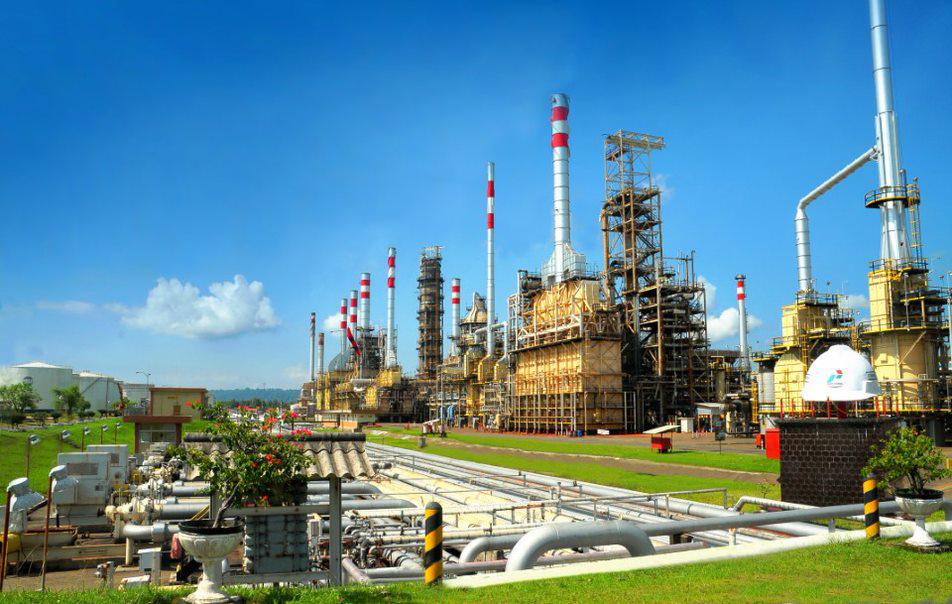 PT KPI Cilacap Unit, one of Pertamina's refineries that becomes the location for the development of Biorefinery and produces clean energy such as 100% Green Diesel and BioAvtur J2-4.
PT KPI Cilacap Unit, one of Pertamina's refineries that becomes the location for the development of Biorefinery and produces clean energy such as 100% Green Diesel and BioAvtur J2-4.
KESDM Supports Pertamina's "Biorefinery" as the Key to Indonesia's Clean Energy Transition
Jakarta, November 18, 2021 - PT Kilang Pertamina Internasional (PT KPI) continues to be committed to manage the development of a 'Biorefinery' or 'green refinery', a strategy in accelerating the national New Renewable Energy (EBT) mix target by 2025. Biorefinery is Pertamina's clean energy project where refinery processing uses raw materials in the form of renewable feedstock such as RBDPO (palm oil) to UCO (used cooking oil) in order to produce fuel that is more environmentally friendly. As part of the National Strategic Project (PSN), PT KPI's Biorefinery program is in line with the Regulation of the Minister of Energy and Mineral Resources (ESDM) of the Republic of Indonesia No. 12 of 2015 concerning the Provision, Utilization and Trading Administration of Biofuels.
PT KPI is the holding company of Pertamina's refinery and petrochemicals which manages the Biorefinery project at the Plaju and Cilacap Refinery Units. As mentioned by Dadan Kusdiana (16/11), the Director General of the Ministry of Energy and Mineral Resources, PT KPI Unit Plaju and Cilacap have a strategic role in supporting the roadmap for the development of Indonesian Biofuels (BBN) as stated in the General National Energy Plan (RUEN). "Pertamina's refineries have started producing green fuels or green fuel innovation, it is an important aspect in the energy transition considering we are targeting 23% of NRE in the energy mix by 2025," said Dadan.
“PT KPI Cilacap Unit has developed and produced Bioavtur from processing RBDPO or palm oil. PT KPI Plaju Unit is also projected to produce Bioavtur through the processing of Crude Palm Oil (CPO) with a capacity of 20,000 barrels/day," said Dadan, quoted from the "Refineries in Energy Transition" Energy Webinar event organized by the Energy & Mining Editor Society (E2S), on November 16, 2021.
Go Green through Biorefinery Development Strategy
President Director of PT KPI, Djoko Priyono said that there are five strategic initiatives of PT KPI in supporting Indonesia's energy security, namely RDMP (Refinery Development Master Plan), Grass Root Refinery (new refinery construction project), Petrochemical Product Refinery, Refinery of Petrochemical Derivative Products and Biorefinery or 'green refinery'.
In the development of Biorefinery, there are three main strategies implemented by PT KPI. “The first strategy is the utilization of renewable feedstock, or renewable raw materials. Examples of renewable feedstocks that are undergoing processing step at Pertamina's refineries include RBDPO or palm oil and UCO or used cooking oil. Pertamina's refinery produces biofuels from processing these raw materials," Djoko explained.
The second strategy is product testing from renewable feedstock. Examples of trials that have been successfully carried out are the production of HVO or biodiesel at PT KPI Cilacap and Dumai Units. “Pertamina innovates in testing new and renewable fuels in co-processing technology, namely combining natural fuel sources derived from CPO with fossil fuels processed in refineries. The result is a fuel that is more environmentally friendly,” said Djoko.
“The next strategy is expansion. In order to increase the production of biodiesel in Cilacap, revamping is carried out on a processing unit called Treated Distillate Hydro Treating (TDHT).”
The construction of a biorefinery to produce green diesel or green avtur at PT KPI Plaju Unit with a capacity of 20 MBSD is also being finalized with a target to be able to operate continuously starting in 2024. The same project is also being built at PT KPI Cilacap Unit with a gradual capacity of 3 MBSD for 2022 and 6 MBSD for 2023.
Pertamina's Biorefinery development efforts have been initiated with a variety of biofuels products produced through its refinery units. The biofuels products include Green Gasoline at PT KPI Plaju and Cilacap Units, Green Diesel at PT KPI Dumai Unit, as well as Green Avtur J2 and 100% Green Diesel at PT KPI Cilacap Unit.
Pertamina's clean energy innovation at PT KPI Cilacap Unit plays an important role in the history of the national aviation industry through the production of 'Bioavtur J2-4', a biofuel that supports air transportation modes. The development of Bioavtur J2.4 managed by PT KPI through its Dumai and Cilacap units reflects the company's commitment in achieving the goal of Sustainable Development Goals (SDGs) Number 7 'Clean and Affordable Energy'. This is because Bioavtur J2-4 produced by PT KPI Unit Cilacap contributes in efforts to reduce carbon emissions. "Clean energy development is part of KPI's strategic initiative, not only to support the national clean energy transition but also to achieve the company's vision to become world-class in refining & petrochemical by 2027," concluded Djoko Priyono.